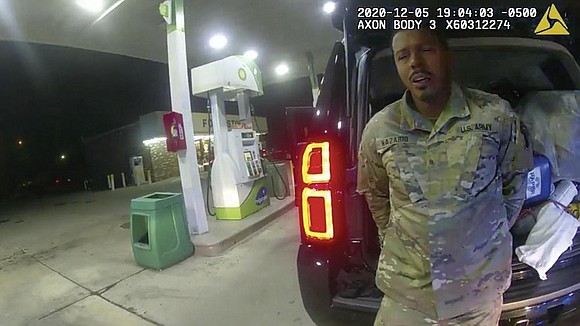No charges for officer who pepper-sprayed Army lieutenant
Ben Finley/The Associated Press | 8/4/2022, 6 p.m.

NORFOLK - A former police officer in Virginia should not be criminally charged but should be investigated for potential civil rights violations after he pepper-sprayed, struck and handcuffed a Black U.S. Army lieutenant during a 2020 traffic stop, a special prosecutor has determined.
The prosecutor’s findings are the latest fallout from a confrontation involving two police officers and a uniformed military of- ficer that drew outrage and national attention to the small town of Windsor, about 70 miles southeast of Richmond.
The man who was pulled over, Caron Nazario, was never charged. Video of the December 2020 traffic stop surfaced in April 2021 after Mr. Nazario sued in federal court, alleging that his constitutional rights were violated. The images sparked outrage and served as a grim reminder to many Black Americans that a military uniform doesn’t necessarily protect against mistreatment by police.
In December, then-Virginia Attorney General Mark Herring’s office sued the town, alleging that it operated in a way that discriminated against Black Americans.
One of the officers, Joe Gutierrez, was fired from the department. He was the target of the special prosecutor’s criminal probe.
“Although I find the video very disturbing and frankly unsettling, Gutierrez’s use of force to remove Nazario did not violate state law as he had given multiple commands for Mr. Nazario to exit the vehicle,” Special Prosecutor Anton Bell said in his report, dated July 29 and posted online by Mr. Nazario’s attorneys.
“The problematic issue, however, were Gutierrez’s statements throughout the entire ordeal, which would lead a reasonable person to wonder whether underlying bias was at the root of how and why Mr. Nazario was treated in like manner,” Mr. Bell wrote.
Mr. Bell’s findings were first reported Aug. 1 by The Virginian-Pilot newspaper.
The incident began when Mr. Nazario was driving home from his duty station, according to his lawsuit. Officer Daniel Crocker radioed that he was attempting to stop a vehicle with no rear license plate and tinted windows.
Mr. Crocker said the driver was “eluding police” and he considered it a “high-risk traffic stop,” according to a report that’s included in the lawsuit. One of Mr. Nazario’s attorneys, Jonathan Arthur, later explained that Mr. Nazario was trying to stop in a well-lit area “for officer safety and out of respect for the officers.”
The other officer, Mr. Gutierrez, was driving by and decided to join the traffic stop, the lawsuit stated. By the time the two officers reached Mr. Nazario’s SUV, the license plate was visible in the rear.
At one point, Mr. Gutierrez told Mr. Nazario he was “fixin to ride the lightning,” a reference to the electric chair that was also a line from the movie “The Green Mile,” a film about a Black man facing execution, the lawsuit said.
Mr. Nazario got out and asked for a supervisor. Mr. Gutierrez responded with “knee-strikes” to his legs, knocking him to the ground, the lawsuit says. The two officers struck him multiple times, then handcuffed and interrogated him.
The traffic stop was captured on Mr. Nazario’s cellphone as well as the officer’s body-worn cameras.






